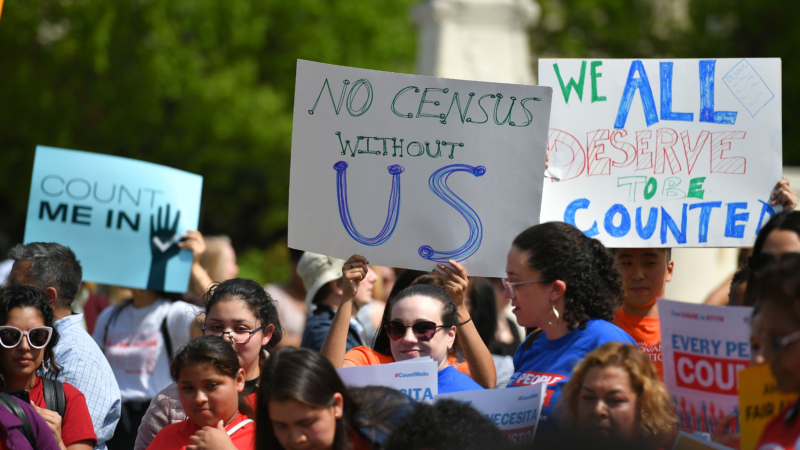A new study quantifies how a citizenship question would likely hurt census accuracy
Adding a citizenship question to U.S. census forms — a change that many Republicans in Congress and President Trump have wanted — would likely undermine the accuracy of the country’s population counts, a new peer-reviewed study shows.
The findings, published last week in the Journal of Policy Analysis and Management, build on earlier research by the Census Bureau and quantify longstanding concerns among opponents of the question, who fear it could derail the once-a-decade tally of U.S. residents that’s used to redistribute political representation and federal funding to communities.
Census participation levels have long varied among different demographic groups. For example, in the 2020 census, those differences helped drive the overcounting of people who identify as white and not Hispanic and the undercounting of Latinos.
Researchers behind the newly released article have now concluded that response rates for many of the least responsive groups would have fallen even lower if questionnaires for the last census had asked, “Is this person a citizen of the United States?”
Misty Heggeness, one of the article’s coauthors, says there’s “already a huge gap” between populations that are less responsive to the census and those that are more responsive. “And adding a citizenship question to the questionnaire increases that gap even more,” says Heggeness, who left the bureau in 2022 and is now an associate professor of public affairs and economics at the University of Kansas.
A census citizenship question is especially sensitive among non-U.S. citizens
To analyze the question’s effect on census participation, Heggeness and J. David Brown, a senior researcher for economic demography at the bureau, compared the results of a national experiment the bureau conducted in 2019 with the results of a simulated census involving administrative records from government and third-party sources.
Their study found that when the citizenship question is included, the gap between the self-response rate for households with only U.S.-born people who identify as white and not Hispanic and the rate for households with at least one person who is likely without legal status widens by more than 2 percentage points.
It’s a sign, write Brown and Heggeness in their article, of how adding this kind of question likely “reduces the total number of people in the count and disproportionately undercounts” populations that have been historically underrepresented in census results. The question’s sensitivity is particularly evident in the lower response rates among households with at least one non-U.S. citizen, U.S.-born Latino or naturalized U.S. citizen who was born outside Latin America.
And among households that respond to the census, the question would likely lead to more instances of a participant omitting some people when reporting the residents of their address.
“This suggests that adding a sensitive question to a survey increases the difficulty of obtaining high-quality data about the subpopulations most sensitive to the question. Data quality may suffer even if large investments are made to ameliorate these challenges,” the researchers write.
Many Republicans are calling to add a citizenship question to the 2030 census
Support continues to build among GOP lawmakers for some type of question about U.S. citizenship status on forms for the upcoming tally in 2030.
According to the 14th Amendment, the population totals used to determine each state’s share of congressional seats and Electoral College votes in the coming decade must include the “whole number of persons in each state.”
But in January, Rep. Chuck Edwards of North Carolina reintroduced a bill that calls for using the responses to a citizenship question to exclude “individuals who are not citizens of the United States” from the congressional apportionment counts.
Trump and officials in his current administration have also signaled in recent months that they are considering another push for the question after the U.S. Supreme Court blocked an attempt to add it to 2020 census forms. The administration recently asked a judge to put a lawsuit against the bureau on hold to give Trump officials more time to determine their approach in light of a January executive order by Trump. That order revoked a Biden-era order affirming the 14th Amendment’s census requirements.
In that case, Republican state officials in Louisiana, Kansas, Ohio and West Virginia are trying to force the bureau to exclude two specific types of noncitizens from the 2030 apportionment counts and the numbers used to distribute federal funding — U.S. residents without legal status and residents with visas.
Coming up with counts for those groups would require a new line of questioning into a person’s immigration status — a topic the bureau’s researchers have yet to test for the census.
Edited by Benjamin Swasey
Rideshare union rights, social media limits and other state laws taking effect Jan. 1
Every new year, public media reporters across the country bring us some of the new state laws taking effect where they are. Here are six in 2026.
Guides to help you tackle your New Year’s resolutions
From building your strength to tackling credit card debt, NPR's Life Kit has a newsletter journey to help you tackle your New Year's resolution.
Guides to help you tackle your New Year’s resolutions
From building your strength to tackling credit card debt, NPR's Life Kit has a newsletter journey to help you tackle your New Year's resolution.
Dozens presumed dead in fire at Swiss Alps bar during New Year’s celebration
Dozens of people are presumed dead and about 100 injured, most of them seriously, following a fire at a Swiss Alps bar during a New Year's celebration, police said Thursday.
Warren Buffett officially retires as Berkshire Hathway’s CEO
The legendary 95-year-old investor spent decades building his company into one of the world's largest and most powerful. Now Greg Abel is taking it over.
Crypto soared in 2025 — and then crashed. Now what?
For most of 2025, cryptocurrencies such as bitcoin surged as President Trump vowed to make the U.S. a crypto leader. But now, a severe sell-off has shaken the sector.






